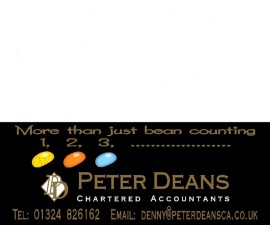We keep you updated
We provide our clients with regular updates on changes in taxation regulation, news from the world of accounting and, of course, information about the latest developments at Peter Deans Chartered Accountants.
Running a business can be a very rewarding experience, but it can also present you with a number of challenges. You may just be starting out and need to raise finance, or be looking for advice on how to expand the business as you grow.
A Chartered Accountant (CA) can benefit your business no matter what size or stage it is currently at. A CA can do much more that just prepare accounts.
See the difference using a CA has made to other businesses - http://www.trustedinbusiness.org.uk/
Tax Charge on Child Benefit
From 7 January 2013, any taxpayer with income above £50,000 in a tax year who receives child benefit or whose partner receives child benefit, will be laible to incur a new income tax charge.
The tax year ended 5 Arpril 2013 will be the first affected by this new charge. Please click the link below for further information or contact us direct.
National Minimum Wage rates
Changes were made on 1 October 2013.
The National Minimum Wage rate per hour depends on your age and whether you’re an apprentice - you must be at least school leaving age to get it.
| Year | 21 and over | 18 to 20 | Under 18 | Apprentice* |
|---|---|---|---|---|
| 2013 (current rate) | £6.31 | £5.03 | £3.72 | £2.68 |
| 2012 | £6.19 | £4.98 | £3.68 | £2.65 |
| 2011 | £6.08 | £4.98 | £3.68 | £2.60 |
| 2010 | £5.93 | £4.92 | £3.64 | £2.50 |
*This rate is for apprentices under 19 or those in their first year. If you’re 19 or over and past your first year you get the rate that applies to your age.
Peter Deans Chartered Accountants Annual Golf Day
The winning team of Brian Gilmour, Lindsay Stewart, Kenny Maguire and Harry Salmond sinking the putt that clinched it on the 18th hole!
Thanks to all who attended, despite the weather (again) everyone seems to enjoyed the event. Thanks also to Tulliallan Golf Club for it's expert hosting of the event.
AUTOMATIC PENSION ENROLMENT AND THE EMPLOYER DUTIES AT A
GLANCE
The employer duties are being introduced in stages from October 2012. Employers need to identify their staging date to determine when their duties first
apply.
This also sets the date for automatic re-enrolment.
Most employers will have to set up and contribute to a pension scheme suitable for
automatic enrolment.
Employers must assess their workforce to determine which types of worker they employ.
Workers can be categorised as eligible jobholders, non-eligible job holders or
entitled workers.
Employers will have different duties depending on the types of worker they employ.
They'll need to automatically enrol some workers into an automatic enrolment
scheme and arrange membership of a pension scheme for others. They're also responsible
for the on-going maintenance of the scheme and have an obligation to keep
certain records.
The employer duties are not optional. The Pensions Regulator will ensure that
employers comply with their duties. Although their approach will be to educate
and encourage compliance, employers will face substantial fines or even
imprisonment if they do not comply.
See Derek's comments about recent Budget in Royal Bank of Scotland Business Sense
http://www.rbs-businesssense.co.uk/regional-growth-scotland.html
IS YOUR TAX CODE CORRECT?
You may be receiving a tax code in the next week or
two. This will tell you your tax-free
amount for 2013-2014.
You should check this is correct as new rules make the tax
payer directly responsible for checking their code is correct and correcting
any mistakes that may have been made. If you do not do this and later appeal
you may find your appeal is not upheld.
HMRC usually sends a different tax code for each income you
have. Letters and numbers are used to calculate how much you are allowed to
earn before income tax is payable.
From 5 April 2013 you will have a tax free allowance of
£9,440, unless born before 5 April 1948. This will form the basis for many tax
codes.
The common letters you will use are:
Code - L
The basic personal allowance so code 944L.
Code - K
You may have extra untaxed income such as company benefits
e.g. healthcare.
Code - BR
Your income is taxed at the basic rate of 20%. You may have
other income which has attracted your personal allowances.
Code - P
You will be aged 65 to 74 and eligible for the full personal
allowance.
Code - Y
You will be aged over 75 and eligible for the full personal
allowance.
If you are unsure or require further assistance please do
not hesitate to contact Peter Deans Chartered Accountants.






